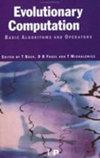Adaptive Ranking-Based Constraint Handling for Explicitly Constrained Black-Box Optimization
IF 3.4
2区 计算机科学
Q2 COMPUTER SCIENCE, ARTIFICIAL INTELLIGENCE
引用次数: 0
Abstract
We propose a novel constraint-handling technique for the covariance matrix adaptation evolution strategy (CMA-ES). The proposed technique is aimed at solving explicitly constrained black-box continuous optimization problems, in which the explicit constraint is a constraint whereby the computational time for the constraint violation and its (numerical) gradient are negligible compared to that for the objective function. This method is designed to realize two invariance properties: invariance to the affine transformation of the search space, and invariance to the increasing transformation of the objective and constraint functions. The CMA-ES is designed to possess these properties for handling difficulties that appear in black-box optimization problems, such as non-separability, ill-conditioning, ruggedness, and the different orders of magnitude in the objective. The proposed constraint-handling technique (CHT), known as ARCH, modifies the underlying CMA-ES only in terms of the ranking of the candidate solutions. It employs a repair operator and an adaptive ranking aggregation strategy to compute the ranking. We developed test problems to evaluate the effects of the invariance properties, and performed experiments to empirically verify the invariance of the algorithm. We compared the proposed method with other CHTs on the CEC 2006 constrained optimization benchmark suite to demonstrate its efficacy. Empirical studies reveal that ARCH is able to exploit the explicitness of the constraint functions effectively, sometimes even more efficiently than an existing box-constraint handling technique on box-constrained problems, while exhibiting the invariance properties. Moreover, ARCH overwhelmingly outperforms CHTs by not exploiting the explicit constraints in terms of the number of objective function calls.基于自适应排序的显式约束黑盒优化约束处理
我们为协方差矩阵自适应进化策略(CMA-ES)提出了一种新的约束处理技术。所提出的技术旨在解决显式约束的黑盒连续优化问题,其中显式约束是一种约束,与目标函数相比,违反约束的计算时间及其(数值)梯度可以忽略不计。该方法旨在实现两个不变性:对搜索空间的仿射变换的不变性,以及对目标函数和约束函数的递增变换的不变性。CMA-ES被设计为具有这些特性,用于处理黑盒优化问题中出现的困难,如不可分性、不良条件、鲁棒性和目标中的不同数量级。所提出的约束处理技术(CHT),即ARCH,仅根据候选解决方案的排序来修改底层CMA-ES。它采用修复算子和自适应排名聚合策略来计算排名。我们开发了测试问题来评估不变性的影响,并进行了实验来实证验证算法的不变性。我们将所提出的方法与CEC 2006约束优化基准套件上的其他CHT进行了比较,以证明其有效性。实证研究表明,ARCH能够有效地利用约束函数的明确性,有时甚至比现有的盒约束处理技术更有效地处理盒约束问题,同时表现出不变性。此外,ARCH在目标函数调用数量方面没有利用显式约束,因此其性能远远优于CHT。
本文章由计算机程序翻译,如有差异,请以英文原文为准。
求助全文
约1分钟内获得全文
求助全文
来源期刊

Evolutionary Computation
工程技术-计算机:理论方法
CiteScore
6.40
自引率
1.50%
发文量
20
审稿时长
3 months
期刊介绍:
Evolutionary Computation is a leading journal in its field. It provides an international forum for facilitating and enhancing the exchange of information among researchers involved in both the theoretical and practical aspects of computational systems drawing their inspiration from nature, with particular emphasis on evolutionary models of computation such as genetic algorithms, evolutionary strategies, classifier systems, evolutionary programming, and genetic programming. It welcomes articles from related fields such as swarm intelligence (e.g. Ant Colony Optimization and Particle Swarm Optimization), and other nature-inspired computation paradigms (e.g. Artificial Immune Systems). As well as publishing articles describing theoretical and/or experimental work, the journal also welcomes application-focused papers describing breakthrough results in an application domain or methodological papers where the specificities of the real-world problem led to significant algorithmic improvements that could possibly be generalized to other areas.
 求助内容:
求助内容: 应助结果提醒方式:
应助结果提醒方式:


